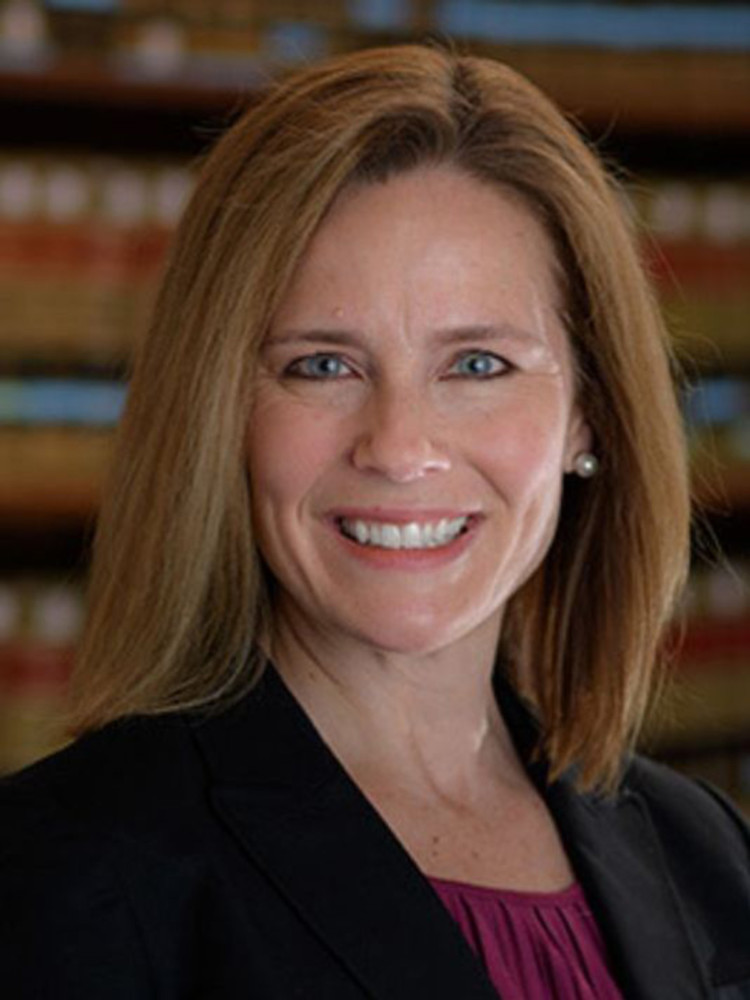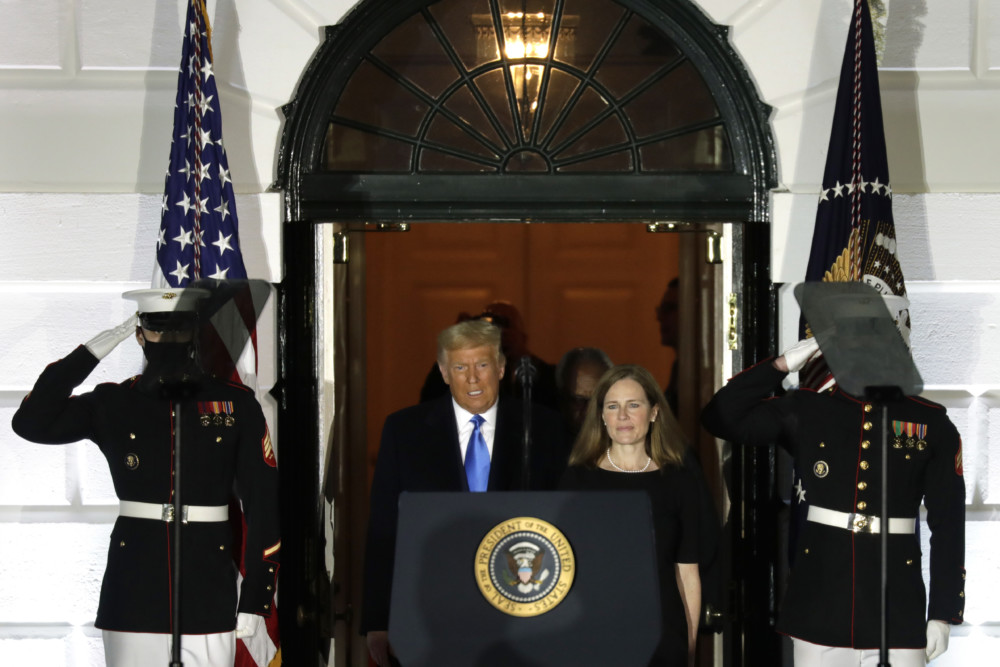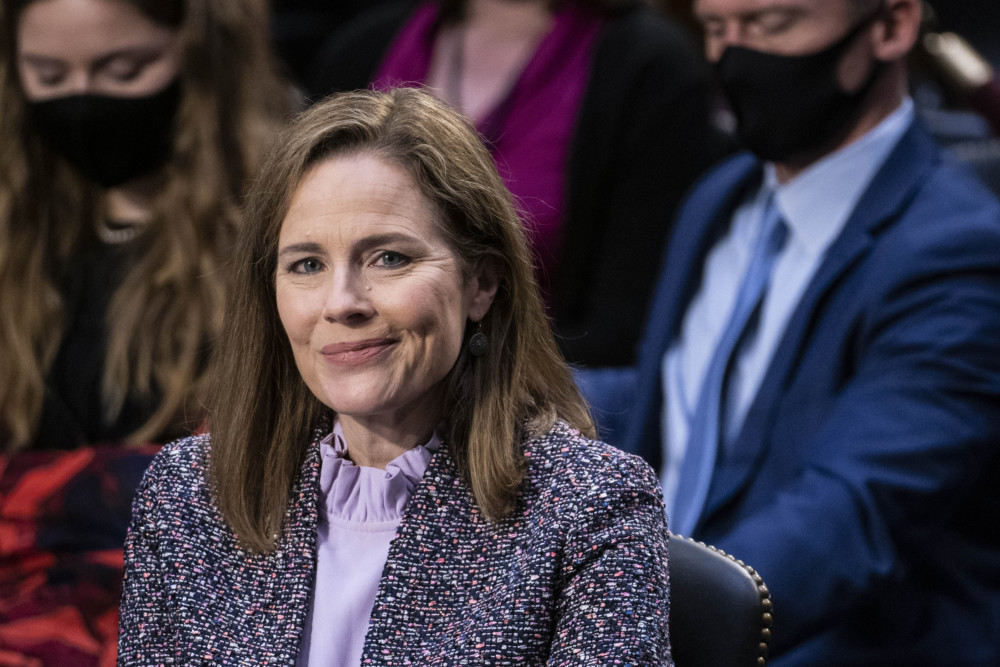By Todd Ruger
CQ-Roll Call
WWR Article Summary (tl;dr) At today’s ceremony in the Rose Garden, Barrett said she models her approach to the law to that of former Justice Antonin Scalia. Barrett also pointed to the real life friendship between Ruth Bader Ginsburg and Justice Antonin Scalia, who she clerked for, “even though they disagreed fiercely in print.”
Washington
By the time President Donald Trump officially introduced Amy Coney Barrett as his Supreme Court nominee Saturday evening at the White House, much of the dramatic tension already had been resolved over what unfolds over the next weeks, months and years.
Barrett, a former law professor and reliably conservative federal appeals court judge for the past three years, had long been the front runner for the spot if Justice Ruth Bader Ginsburg left the bench during Trump’s presidency.
“She is a woman of unparalleled achievement, towering intellect, sterling credentials and unyielding loyalty to the Constitution,” Trump said Saturday from the White House Rose Garden. “I looked and I studied and you are very eminently qualified for this job. You are going to be fantastic. Really fantastic.”
Barrett gave a nod during her brief remarks to the woman she would succeed on the Supreme Court.
“Should I be confirmed, I will be mindful of who came before me,” Barrett said of Ginsburg, who began her career at a time when women were not welcome in the legal world. “But she not only broke glass ceilings, she smashed them. For that she has won the admiration of women across the country, and indeed, all over the world.”
Barrett pointed to the friendship in person between Ginsburg and Justice Antonin Scalia, who she clerked for, “even though they disagreed fiercely in print.”
And she directly linked her approach to the law to that of Scalia, whose wife Maureen was in the audience.
“His judicial philosophy is mine, too,” Barrett said. “A judge must apply the law as written. Judges are not policymakers, and they must be resolute in setting aside any policy views they might hold.”
In the week after Ginsburg’s death, the reality-show-star-turned-president didn’t put much effort into creating a mystery around the big reveal of his pick.
The selection leaked to the media a day early. Members of Congress, talking heads and outside advocacy groups already had been drawing battle lines for Senate Republicans’ plan for a quick confirmation process for Barrett in what will be a bright and hot political spotlight.
Republicans appeared to have enough votes to confirm her as Trump’s third Supreme Court appointment, either just before or just after the Nov. 3 presidential election, barring any major surprises.
And conservatives and liberals seemed to agree that a Justice Barrett, a former clerk of the late conservative legal icon Justice Antonin Scalia, would firmly establish a 6-3 conservative majority that within months and over the years could push the Supreme Court rightward on contentious issues such as abortion rights, gun control, religious rights, immigration, healthcare, among others.
“The stakes for our country are incredibly high,” Trump said. “Rulings that the Supreme Court will issue in the coming years will decide the survival of our Second Amendment, our religious liberty, our public safety and so much more.”
The lack of drama belies the importance of the moment for the direction of the court. David Cole, the national legal director of the American Civil Liberties Union, wrote in an op-ed in The Washington Post that if Barrett is confirmed, “a die-hard conservative would once again replace a civil rights hero, and the resulting shift will be tectonic.”
“With a court composed of six conservatives and three liberals, it would be extraordinarily difficult for liberals to win, and conservatives to lose, virtually any ideologically charged dispute,” Cole wrote.
The coming confirmation fight will delve into Barrett’s record on the U.S. Court of Appeals for the 7th Circuit, where she ruled conservatively on some of those topics. Senators will also explore those issues that came up during her confirmation process for that 7th Circuit seat, such as her writings as a law professor at Notre Dame and her faith, she is a Roman Catholic, and its importance to her.
Barrett addressed the final part of her comments to Americans, and said that if confirmed she would administer justice without respect to persons and not for those in her own circle.
“I have no illusions that the road ahead of me will be easy, either for the short term, or the long haul,” Barrett said.
Barrett’s backers point to her intelligence, her relative youth and her rock-solid conservative approach to the law. “And she is an everyday American from the Heartland, who is a working mother of seven children, including a child with disabilities and two children adopted from Haiti,” said Mike Davis, the president of Article III Project, which advocates for Trump’s judicial picks.
It appears that Senate debate will do little to determine the confirmation vote. If past confirmations are prologue, Barrett during the hearing will decline to give clear answers about how she might rule on hot-button issues that are still in the courts.
But there will be plenty of questions from Judiciary Committee members highlighting expectations of how she would rule on big issues. Trump previously said he would put justices on the Supreme Court who would overturn Roe v. Wade, the landmark 1973 decision that established a constitutional right to an abortion.
“Amy Coney Barrett certainly has the support of pro-life Americans who know, perhaps better than anyone else, the danger of activist judges,” Jeanne Mancini, president of anti-abortion organization March for Life, said in a news release.
Discussions on those issues will reverberate through an energized political environment ahead of an election that not only will determine which party’s president will appoint federal judges during the next four years, but which party will control the Senate, and therefore the confirmation process.
Amid a backdrop of the COVID-19 pandemic and with Trump repeatedly suggesting the presidential election will be contested and possibly decided by the Supreme Court, conservative advocacy group Judicial Crisis Network and liberal advocacy group Demand Justice announced they would spend millions on the confirmation fight.
“The public already opposes rushing a Court pick through so close to the election, and in selecting Amy Coney Barrett, Trump has chosen the person most likely to turbocharge the intensity of the opposition to this whole process,” Brian Fallon, the executive director of Demand Justice, tweeted Friday.
Judiciary Committee Chairman Lindsey Graham of South Carolina has not announced a schedule for confirmation hearings, but has announced he backs a confirmation vote on the floor before the election. That means hearings could start as early as Oct. 12.
Distributed by Tribune Content Agency, LLC.
















































































































































































































































































































































































